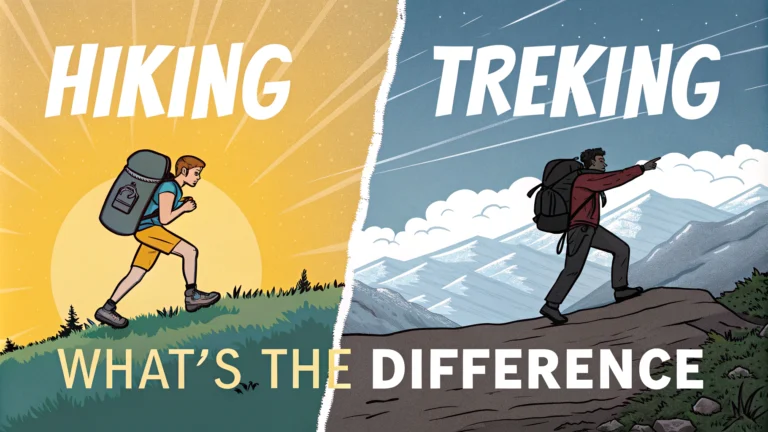Many outdoor enthusiasts mix up **hiking** and **trekking**, but these activities have distinct characteristics that set them apart. Choosing between them can significantly impact your gear selection, preparation, and overall outdoor experience.
The main differences lie in **duration**, **difficulty**, and **technical requirements**. While hiking typically involves day trips on marked trails, trekking often spans multiple days through varied terrain and weather conditions.
Essential Equipment Differences
- **Hiking Basics**:
– Day pack (15-30L)
– Water bottle
– Trail snacks
– Basic first aid
– Weather-appropriate clothing - **Trekking Gear**:
– Large backpack (40-70L)
– Camping equipment
– Multi-day food supplies
– Navigation tools
– Emergency shelter
Physical Demands and Preparation
**Hiking** requires basic cardiovascular fitness and can be adapted to various skill levels. **Trekking** demands enhanced endurance, strength, and technical skills due to extended duration and challenging terrain.
| Aspect | Hiking | Trekking |
|---|---|---|
| Duration | 2-8 hours | Multiple days |
| Distance | 5-15 miles/day | 10-20 miles/day |
| Terrain | Marked trails | Various landscapes |
Planning and Navigation Requirements
**Hiking** typically requires basic trail knowledge and simple navigation skills. **Trekking** demands advanced planning, including:
- Route mapping and waypoint identification
- Weather pattern analysis
- Campsite locations and water sources
- Emergency exit routes
Safety Considerations for Both Activities
Safety needs differ significantly between hiking and trekking adventures. Understanding these requirements helps prevent accidents and emergencies.
Basic Safety Protocols
- **Always inform** someone of your plans and expected return time
- **Carry identification** and emergency contacts
- **Check weather** forecasts before departure
- **Stay on marked trails** when hiking
Emergency Preparedness
- **Hiking Emergency Kit**:
– Basic first aid supplies
– Emergency whistle
– Flashlight
– Extra snacks and water - **Trekking Emergency Kit**:
– Comprehensive first aid kit
– Emergency shelter
– Water filtration system
– Satellite communication device
Environmental Impact and Trail Ethics
Following **Leave No Trace** principles helps protect natural environments for future outdoor enthusiasts.
- Pack out all trash
- Stay on designated trails
- Minimize campfire impact
- Respect wildlife and plant life
- Camp at least 200 feet from water sources
Choosing the Right Activity for Your Skill Level
Match your experience and fitness level with appropriate trails and routes.
| Experience Level | Recommended Activity |
|---|---|
| Beginner | Short day hikes on marked trails |
| Intermediate | Full-day hikes with elevation gain |
| Advanced | Multi-day treks with technical sections |
Making the Most of Your Outdoor Adventure
Proper preparation creates rewarding outdoor experiences regardless of your chosen activity.
Tips for Success
- **Start small** and gradually increase difficulty
- **Join local groups** to learn from experienced outdoors people
- **Document your trips** to track progress
- **Maintain your gear** between adventures
“The best adventure is the one you’re properly prepared for.”
Hiking vs Trekking FAQs
Basic Differences
Q: What’s the main difference between hiking and trekking?
A: Hiking typically involves shorter day trips on marked trails, while trekking consists of multi-day journeys through more challenging terrain, often requiring camping and carrying supplies.
Q: Is trekking harder than hiking?
A: Yes. Trekking requires more physical endurance, technical skills, and equipment as it involves longer distances, varied terrain, and multiple days of continuous activity.
Equipment & Preparation
Q: What gear do I need for hiking vs trekking?
A:
Hiking basics:
• Day pack
• Water bottle
• Trail shoes
• Weather-appropriate clothing
• Snacks
Trekking essentials:
• Larger backpack (40L+)
• Camping gear
• Multiple clothing layers
• Navigation tools
• First aid supplies
• Cooking equipment
Q: Do I need special boots for trekking?
A: Yes. Trekking requires sturdy boots with ankle support and waterproofing, while hiking can often be done in lighter trail shoes.
Technical Aspects
Q: What’s the average length of a hiking trip vs trekking expedition?
A: Hiking typically ranges from 2-8 hours (3-15 miles), while trekking expeditions usually last 2+ days covering 20+ miles.
Q: Can beginners go trekking?
A: Beginners should start with hiking and progress to easy treks. Basic outdoor skills, physical fitness, and proper guidance are essential before attempting serious treks.
Popular Questions
Q: Which burns more calories – hiking or trekking?
A: Trekking typically burns more calories (400-600 calories/hour) compared to hiking (300-450 calories/hour) due to longer duration and heavier loads.
Q: Is high-altitude trekking dangerous?
A: High-altitude trekking carries risks including altitude sickness, weather changes, and remoteness. Proper acclimatization and preparation are essential.
Q: What’s better for weight loss – hiking or trekking?
A: Both are effective, but trekking typically leads to more weight loss due to:
• Longer duration
• Higher intensity
• Carrying heavier loads
• Multiple days of continuous activity
Q: Can I trek alone or should I join a group?
A: Beginners should join guided groups for safety, especially for remote treks. Solo trekking requires extensive experience and safety precautions.
Q: What weather conditions are safe for trekking vs hiking?
A: Hiking can be done in most mild to moderate weather conditions. Trekking requires more careful weather monitoring and preparation for extreme conditions.
| Activity | Duration | Difficulty | Equipment Needs |
|---|---|---|---|
| Hiking | 2-8 hours | Easy to Moderate | Basic |
| Trekking | 2+ days | Moderate to Difficult | Extensive |



















